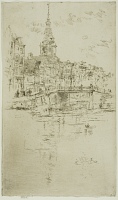Church, Amsterdam | ||
| Number: | 445 | |
| Date: | 1889 | |
| Medium: | etching | |
| Size: | 220 x 131 mm | |
| Signed: | butterfly at upper right | |
| Inscribed: | no | |
| Set/Publication: | no | |
| No. of States: | 1 | |
| Known impressions: | 4 | |
| Catalogues: | K.411; M.410 | |
| Impressions taken from this plate (4) | ||
TECHNIQUE
Intricately detailed, with tiny strokes of the etching needle indicating the patterns of roof tiles, windows, railings, and the complexity of the architecture, and freer, slightly longer strokes for clouds and water. The extant impressions look underinked or as if the plate was underbitten, giving the print a consistent but slightly spotty appearance.
Fine commented on the technique: 'Exceedingly delicate, it is unusual in its drawing style for the period: entirely composed of the briefest of short strokes, almost never overlapping. Furthermore, it is marked throughout with dots, probably evidence of foul biting.' 9
9: Ruth Fine, Los Angeles 1984 (cat. no. 86).
PRINTING
Church, Amsterdam is very rare. Only three impressions are known before cancellation, one printed in black ink on ivory laid paper (), another in dark brown ink on a light-weight ivory laid (), and the third in brown on 'antique' (pre-1800) laid paper (). They were trimmed to the platemark and signed on the tab with a butterfly and 'imp.' to show that Whistler had printed them.
An impression from the cancelled plate is printed in black ink on ivory wove paper ().
In 1931 two impressions were apparently printed by Nathaniel Sparks (1880-1956), who noted cryptically, and practically illegibly, '2 Proofs not marked / on his own paper'. 10 These were presumably from the cancelled plate. Why he printed from the cancelled plate is not clear. They have not been located and were probably destroyed.
10: Martin Hopkinson, 'Nathaniel Sparks's Printing of Whistler's Etchings', Print Quarterly, 1999, Vol. 16, No. 4, pp. 340, 348, 352.
